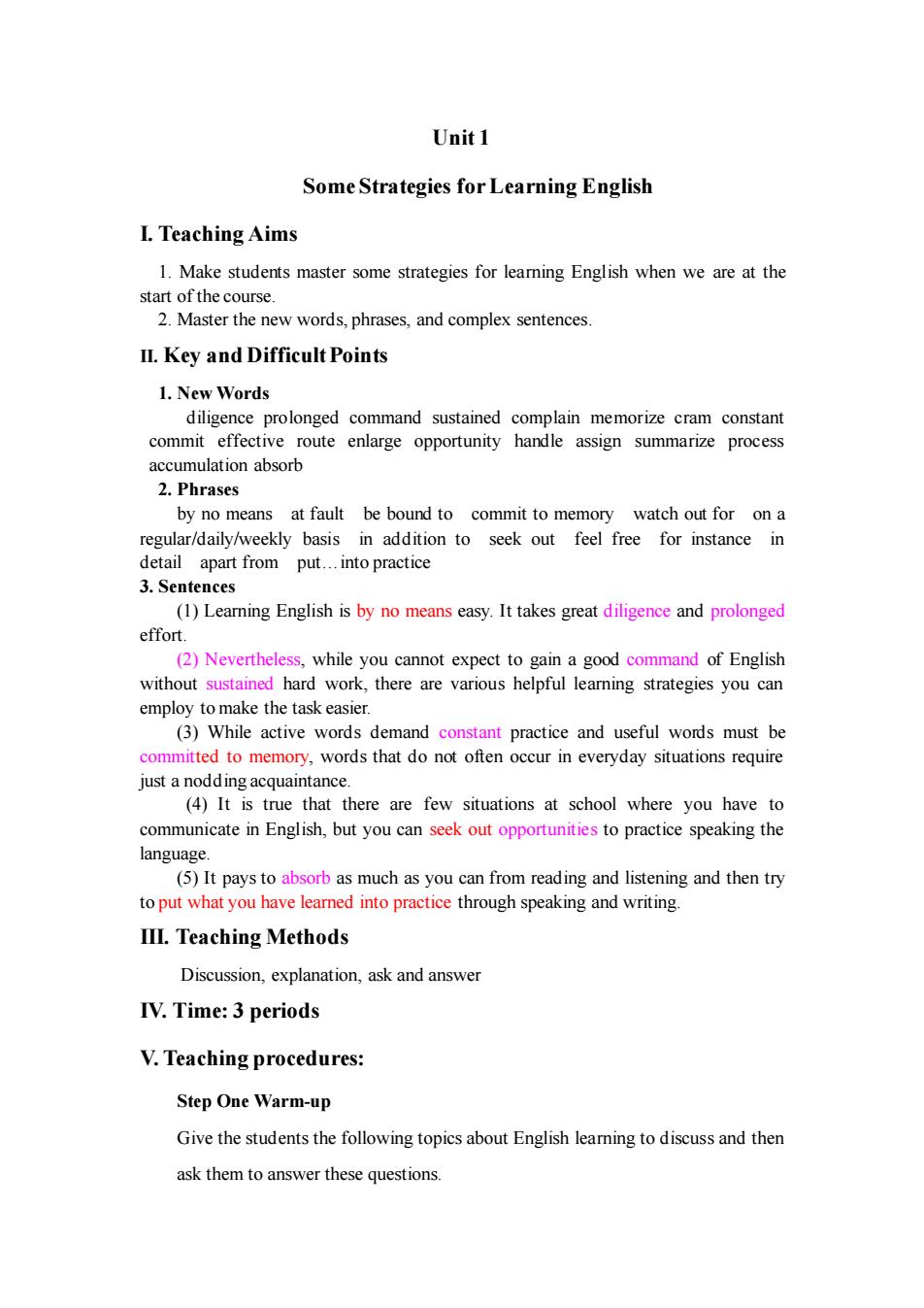
Unit 1 Some Strategies for Learning English I.Teaching Aims 1.Make students master some strategies for leaming English when we are at the aster the new words.phrases.and complex sentences. urse II.Key and Difficult Points 1.New Words commit effective route enlarge opportunity handle assign summarize process accumulation absorb 2.Phrases by no means at fault be bound to commit to memory watch out for on a s in addition to seek out feel free for instance in 3.Sentences (1)Learning English is by no means easy.It takes great diligence and prolonged effort (2)Nevertheless,while you cannot expect to gain a good command of English without hard work,there are various helpful leamning youcn employ to make the task easier. (3)While active words demand constant practice and useful words must be committed to memory,words that do not often occur in everyday situations require just a nodding acquaintance. (4)1t is true that there are few situations at school where you have to communicate in English,but you can seek out opportunities to practice speaking the anguage. (5)It pays to absorb as much as you can from reading and listening and then try to put what you have leamed into practice through speaking and writing. Ⅲ.Teaching Methods Discussion,explanation,ask and answer IV.Time:3 periods V.Teaching procedures: Step One Warm-up Give the students the following topics about English leaming to discuss and then ask them to answer these questions
Unit 1 Some Strategies for Learning English I. Teaching Aims 1. Make students master some strategies for learning English when we are at the start of the course. 2. Master the new words, phrases, and complex sentences. II. Key and Difficult Points 1. New Words diligence prolonged command sustained complain memorize cram constant commit effective route enlarge opportunity handle assign summarize process accumulation absorb 2. Phrases by no means at fault be bound to commit to memory watch out for on a regular/daily/weekly basis in addition to seek out feel free for instance in detail apart from put…into practice 3. Sentences (1) Learning English is by no means easy. It takes great diligence and prolonged effort. (2) Nevertheless, while you cannot expect to gain a good command of English without sustained hard work, there are various helpful learning strategies you can employ to make the task easier. (3) While active words demand constant practice and useful words must be committed to memory, words that do not often occur in everyday situations require just a nodding acquaintance. (4) It is true that there are few situations at school where you have to communicate in English, but you can seek out opportunities to practice speaking the language. (5) It pays to absorb as much as you can from reading and listening and then try to put what you have learned into practice through speaking and writing. III. Teaching Methods Discussion, explanation, ask and answer IV. Time: 3 periods V. Teaching procedures: Step One Warm-up Give the students the following topics about English learning to discuss and then ask them to answer these questions
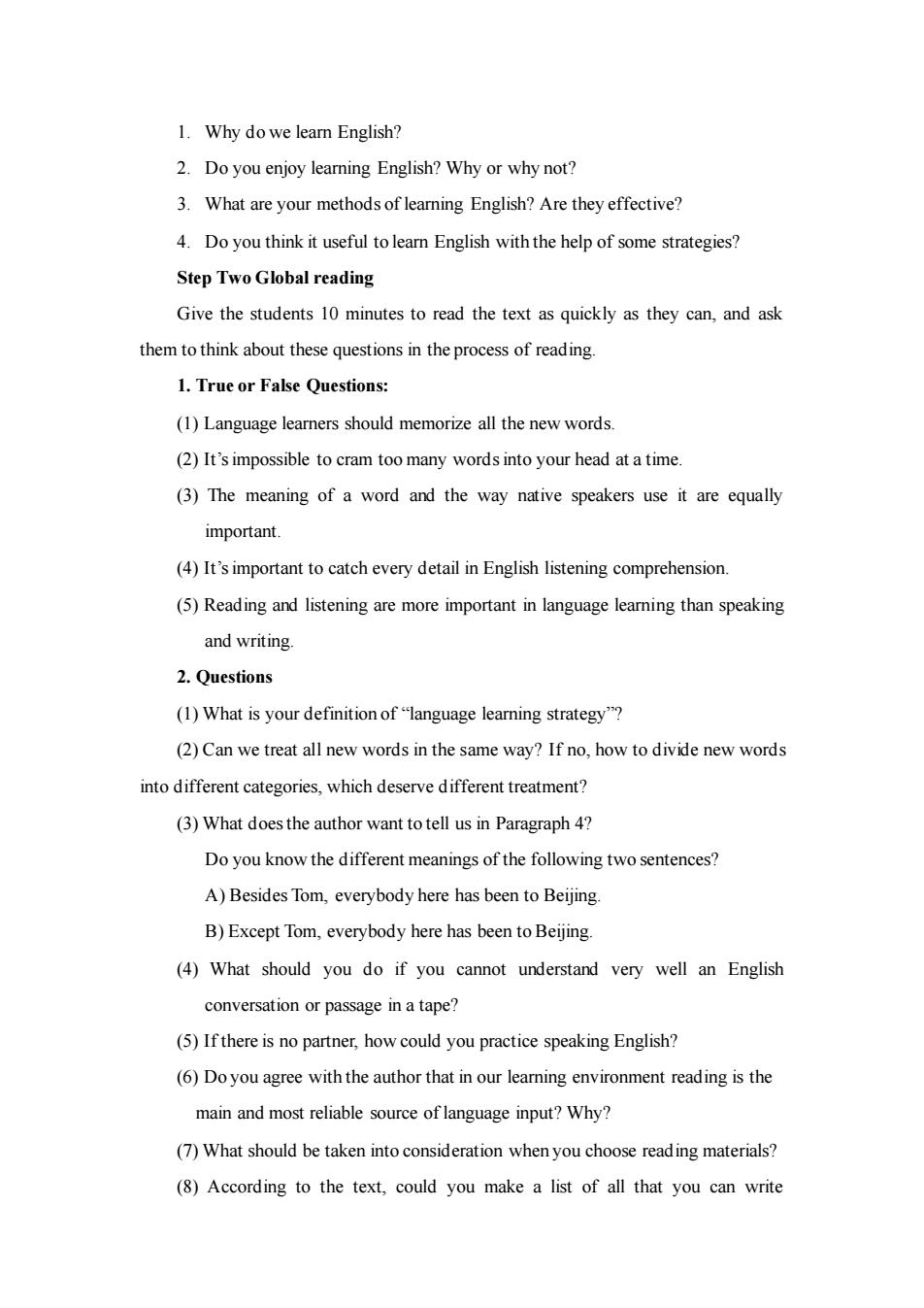
1.Why do we learn English? 2.Do you enjoy learning English?Why or why not? 3.What are your methods of learing English?Are they effective? 4.Do you think it useful to leam English with the help of some strategies? Step Two Global reading Give the students 10 minutes to read the text as quickly as they can,and ask them to think about these questions in the process of reading. 1.Trueor False Questions: (1)Language leamers should memorize all the new words. (2)It's impossible to cram too many words into your head at a time (3)The meaning of a word and the way native speakers use it are equally important. (4)It's important to catch every detail in English listening comprehension. (5)Reading and listening are more important in language leaming than speaking and writing. 2.Questions (1)What is your definition of"language learning strategy? (2)Can we treat all new words in the same way?If no,how to divide new words into different categories,which deserve different treatment? (3)What does the author want totell us in Paragraph 4? Do you know the different meanings of the following two sentences? A)Besides Tom,everybody here has been to Beijing. B)Except Tom,everybody here has been to Beijing. (4)What should you do if you cannot understand very well an English conversation or passage in a tape? (5)Ifthere is no partner,how could you practice speaking English? (6)Do you agree with the author that in our learning environment reading is the main and most reliable source of language input?Why? (7)What should be taken into consideration whenyou choose reading materials? (8)According to the text,could you make a list of all that you can write
1. Why do we learn English? 2. Do you enjoy learning English? Why or why not? 3. What are your methods of learning English? Are they effective? 4. Do you think it useful to learn English with the help of some strategies? Step Two Global reading Give the students 10 minutes to read the text as quickly as they can, and ask them to think about these questions in the process of reading. 1. True or False Questions: (1) Language learners should memorize all the new words. (2) It’simpossible to cram too many words into your head at a time. (3) The meaning of a word and the way native speakers use it are equally important. (4) It’s important to catch every detail in English listening comprehension. (5) Reading and listening are more important in language learning than speaking and writing. 2. Questions (1) What is your definition of “language learning strategy”? (2) Can we treat all new words in the same way? If no, how to divide new words into different categories, which deserve different treatment? (3) What does the author want to tell us in Paragraph 4? Do you know the different meanings of the following two sentences? A) Besides Tom, everybody here has been to Beijing. B) Except Tom, everybody here has been to Beijing. (4) What should you do if you cannot understand very well an English conversation or passage in a tape? (5) If there is no partner, how could you practice speaking English? (6) Do you agree with the author that in our learning environment reading is the main and most reliable source of language input? Why? (7) What should be taken into consideration when you choose reading materials? (8) According to the text, could you make a list of all that you can write
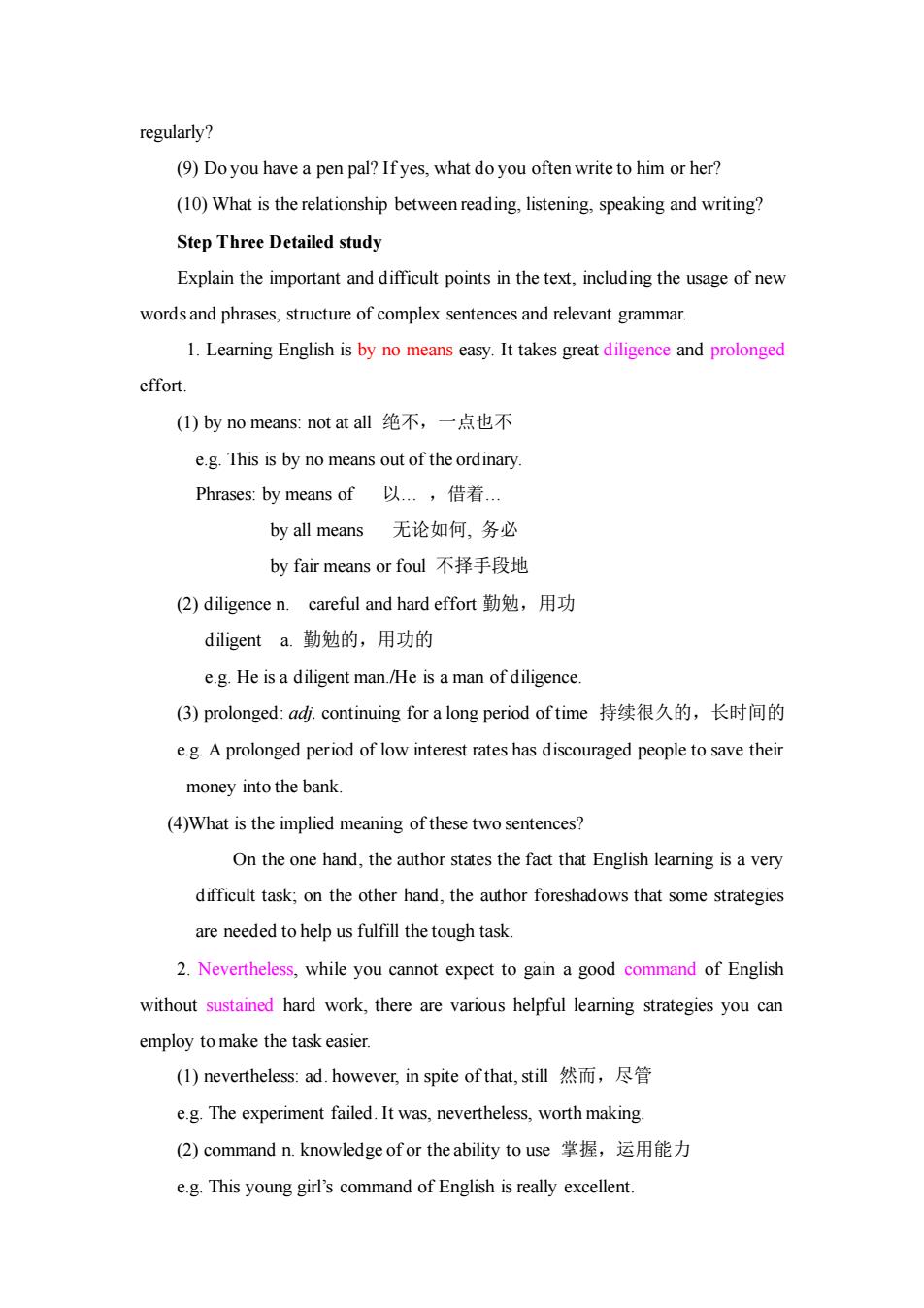
regularly? (9)Do you have a pen pal?Ifyes,what do you often write to him or her? (10)What is the relationship between reading.listening,speaking and writing? Step Three Detailed study Explain the important and difficult points in the text,including the usage of new words and phrases,structure of complex sentences and relevant grammar. 1.Leaming English is by no means easy.It takes great diligence and prolonged effort. (I)by no means:not at all绝不,一点也不 e.g.This is by no means out of the ordinary Phrases::by means of以..,借着. by all means无论如何,务必 by fair means or foul不择手段地 (2)diligence n.careful and hard effort勤勉,用功 diligent a.勤勉的,用功的 e.g.He is a diligent man./He is a man of diligence. (3)prolonged:ad.continuing for a long period oftime持续很久的,长时间的 e.g.A prolonged period of low interest rates has discouraged people to save their money into the bank. (4)What is the implied meaning of these two sentences? On the one hand,the author states the fact that English leaming is a very difficult task;on the other hand,the author foreshadows that some strategies are needed to help us fulfill the tough task. 2.Nevertheless,while you cannot expect to gain a good command of English without sustained hard work,there are various helpful leaming strategies you can employ to make the task easier. (I)nevertheless:ad.however,in spite of that,.stil然而,尽管 e.g.The experiment failed.It was,nevertheless,worth making. (2)command n.knowledge of or the ability to use掌握,运用能力 e.g.This young girl's command of English is really excellent
regularly? (9) Do you have a pen pal? If yes, what do you often write to him or her? (10) What is the relationship between reading, listening, speaking and writing? Step Three Detailed study Explain the important and difficult points in the text, including the usage of new words and phrases, structure of complex sentences and relevant grammar. 1. Learning English is by no means easy. It takes great diligence and prolonged effort. (1) by no means: not at all 绝不,一点也不 e.g. This is by no means out of the ordinary. Phrases: by means of 以… ,借着… by all means 无论如何, 务必 by fair means or foul 不择手段地 (2) diligence n. careful and hard effort 勤勉,用功 diligent a. 勤勉的,用功的 e.g. He is a diligent man./He is a man of diligence. (3) prolonged: adj. continuing for a long period of time 持续很久的,长时间的 e.g. A prolonged period of low interest rates has discouraged people to save their money into the bank. (4)What is the implied meaning of these two sentences? On the one hand, the author states the fact that English learning is a very difficult task; on the other hand, the author foreshadows that some strategies are needed to help us fulfill the tough task. 2. Nevertheless, while you cannot expect to gain a good command of English without sustained hard work, there are various helpful learning strategies you can employ to make the task easier. (1) nevertheless: ad. however, in spite of that, still 然而,尽管 e.g. The experiment failed. It was, nevertheless, worth making. (2) command n. knowledge of or the ability to use 掌握,运用能力 e.g. This young girl’s command of English is really excellent
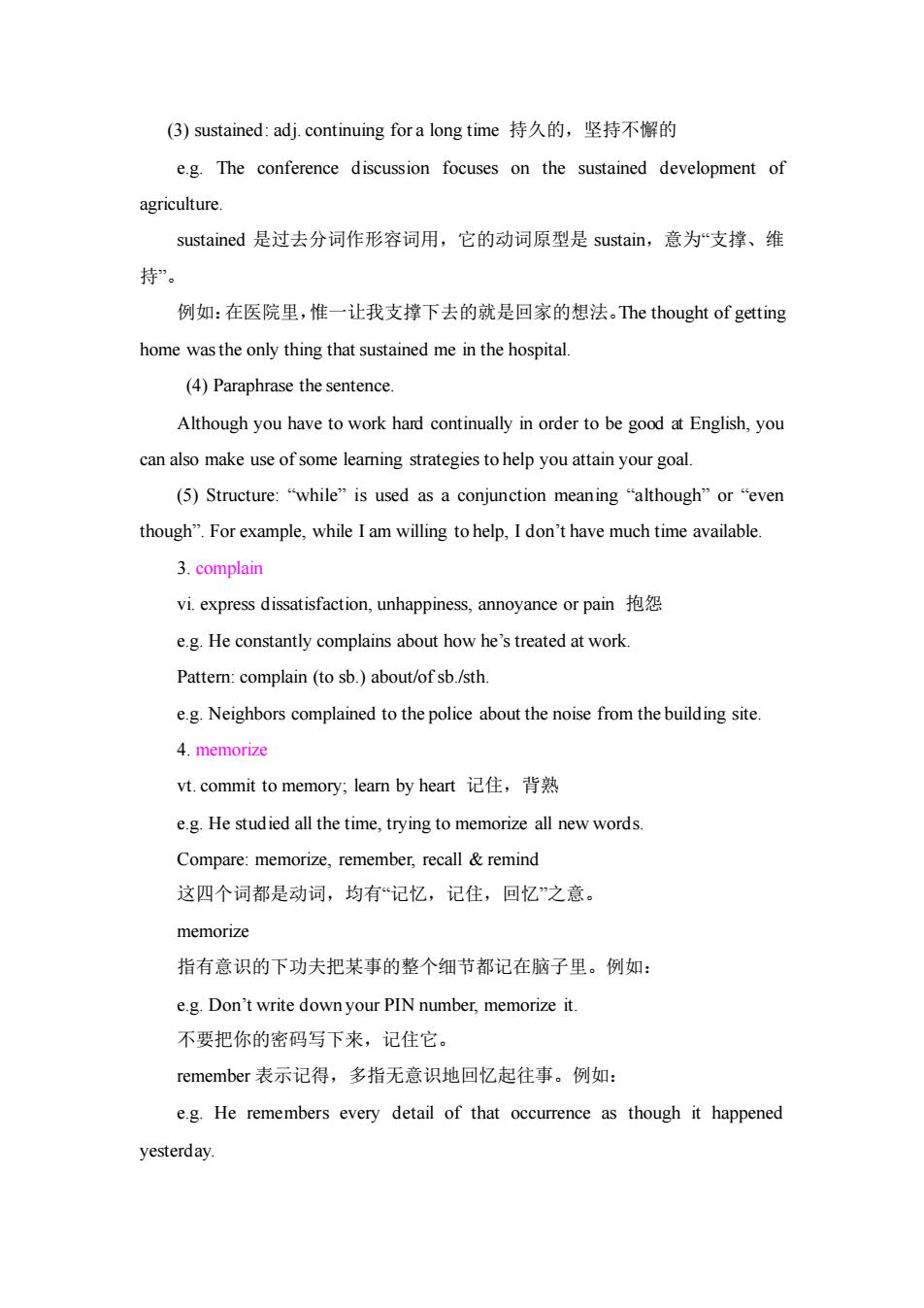
(3)sustained:adj.continuing for a long time持久的,坚持不懈的 e.g.The conference discussion focuses on the sustained development of agriculture sustained是过去分词作形容词用,它的动词原型是sustain,意为“支撑、维 持”。 例如:在医院里,惟一让我支撑下去的就是回家的想法。The thought of getting home was the only thing that sustained me in the hospital (4)Paraphrase the sentence. Although you have to work hard continually in order to be good at English,you can also make use of some leaming strategies tohelp you attain your goal. ()Structure:while”is used as a conjunction meaning“"although”or“even though".For example,while Iam willing to help,I don't have much time available. 3.complain vi.express dissatisfaction,unhappiness,annoyance or pain e.g.He constantly complains about how he's treated at work. Pattem:complain(to sb.)about/ofsb./sth. e.g.Neighbors complained to the police about the noise from the building site 4.memorize vt.commit to memory;leamn by heart记住,背熟 e.g.He studied all the time,trying to memorize all new words Compare:memorize,remember,recall&remind 这四个词都是动词,均有“记忆,记住,回忆”之意。 memorize 指有意识的下功夫把某事的整个细节都记在脑子里。例如: e.g.Don't write down your PIN number,memorize it 不要把你的密码写下来,记住它。 remember表示记得,多指无意识地回忆起往事。例如: e.g.He remembers every detail of that occurrence as though it happened yesterday
(3) sustained: adj. continuing for a long time 持久的,坚持不懈的 e.g. The conference discussion focuses on the sustained development of agriculture. sustained 是过去分词作形容词用,它的动词原型是 sustain,意为“支撑、维 持”。 例如:在医院里,惟一让我支撑下去的就是回家的想法。The thought of getting home was the only thing that sustained me in the hospital. (4) Paraphrase the sentence. Although you have to work hard continually in order to be good at English, you can also make use of some learning strategies to help you attain your goal. (5) Structure: “while” is used as a conjunction meaning “although” or “even though”. For example, while I am willing to help, I don’t have much time available. 3. complain vi. express dissatisfaction, unhappiness, annoyance or pain 抱怨 e.g. He constantly complains about how he’s treated at work. Pattern: complain (to sb.) about/of sb./sth. e.g. Neighbors complained to the police about the noise from the building site. 4. memorize vt. commit to memory; learn by heart 记住,背熟 e.g. He studied all the time, trying to memorize all new words. Compare: memorize, remember, recall & remind 这四个词都是动词,均有“记忆,记住,回忆”之意。 memorize 指有意识的下功夫把某事的整个细节都记在脑子里。例如: e.g. Don’t write down your PIN number, memorize it. 不要把你的密码写下来,记住它。 remember 表示记得,多指无意识地回忆起往事。例如: e.g. He remembers every detail of that occurrence as though it happened yesterday
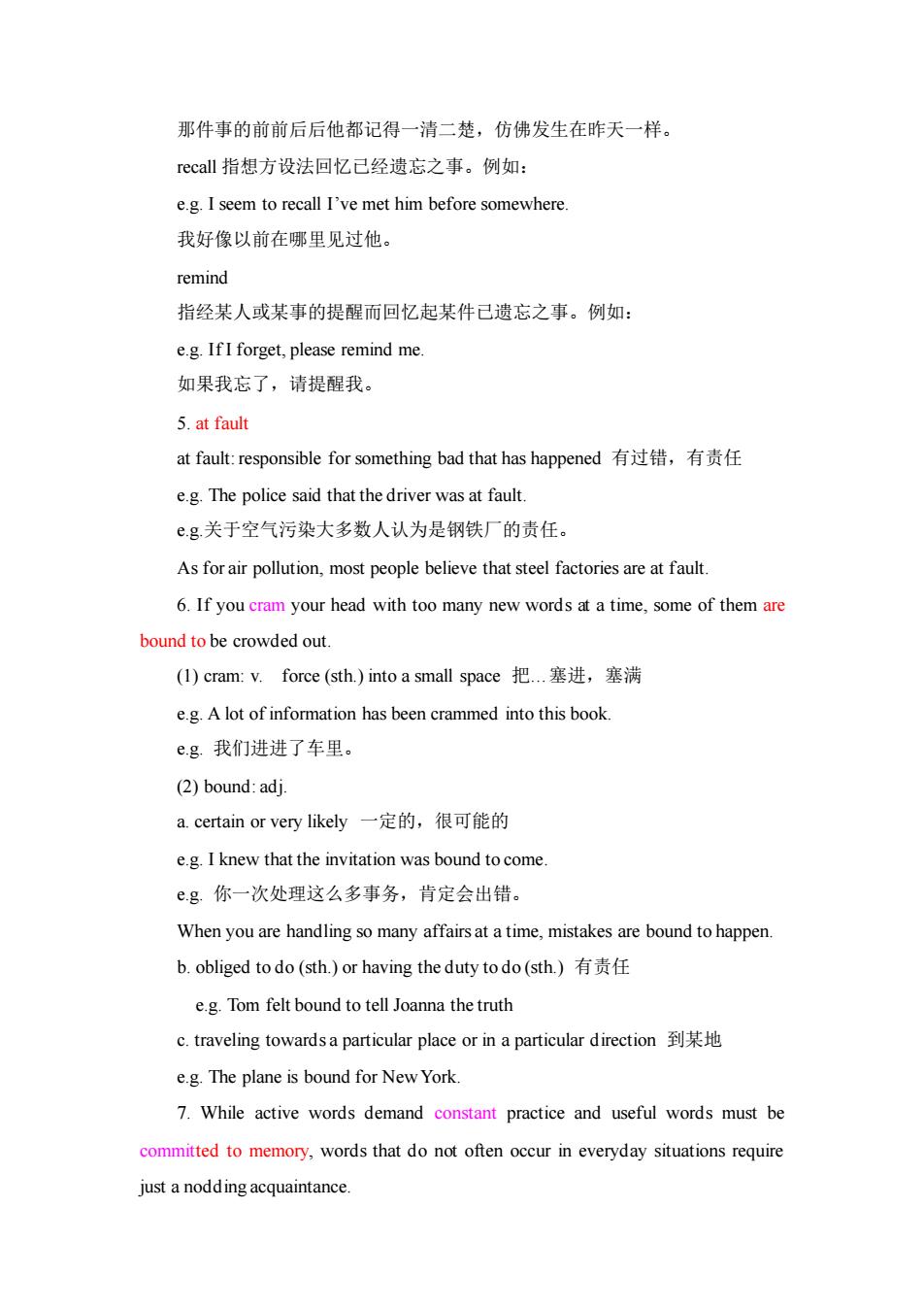
那件事的前前后后他都记得一清二楚,仿佛发生在昨天一样。 recall指想方设法回忆已经遗忘之事。例如: e.g.I seem to recall I've met him before somewhere 我好像以前在哪里见过他: remind 指经某人或某事的提醒而回忆起某件已遗忘之事。例如: e.g.IfI forget,please remind me. 如果我忘了,请提醒我。 5.at fault at fault:responsible for something bad that has happened有过错,有责任 e.g.The police said that the driver was at fault eg关于空气污染大多数人认为是钢铁厂的责任。 As for air pollution,most people believe that steel factories are at fault. 6.If you cram your head with too many new words at a time.some of them are bound to be crowded out. ()cram:V.force(sth)into a small space把.塞进,塞满 e.g.A lot of information has been crammed into this book. eg我们进进了车里。 (2)bound:adj. a.certain or very likely一定的,很可能的 e.g.I knew that the invitation was bound to come eg你一次处理这么多事务,肯定会出错。 When you are handling so many affairs at a time,mistakes are bound to happen. b.obliged to do(sth)or having the duty to do(sth)有责任 e.g.Tom felt bound to tell Joanna the truth c.traveling towardsa particular place or in a particular direction e.g.The plane is bound for New York. 7.While active words demand constant practice and useful words must be committed to memory,words that do not often occur in everyday situations require just a nodding acquaintance
那件事的前前后后他都记得一清二楚,仿佛发生在昨天一样。 recall 指想方设法回忆已经遗忘之事。例如: e.g. I seem to recall I’ve met him before somewhere. 我好像以前在哪里见过他。 remind 指经某人或某事的提醒而回忆起某件已遗忘之事。例如: e.g. If I forget, please remind me. 如果我忘了,请提醒我。 5. at fault at fault: responsible for something bad that has happened 有过错,有责任 e.g. The police said that the driver was at fault. e.g.关于空气污染大多数人认为是钢铁厂的责任。 As for air pollution, most people believe that steel factories are at fault. 6. If you cram your head with too many new words at a time, some of them are bound to be crowded out. (1) cram: v. force (sth.) into a small space 把…塞进,塞满 e.g. A lot of information has been crammed into this book. e.g. 我们进进了车里。 (2) bound: adj. a. certain or very likely 一定的,很可能的 e.g. I knew that the invitation was bound to come. e.g. 你一次处理这么多事务,肯定会出错。 When you are handling so many affairs at a time, mistakes are bound to happen. b. obliged to do (sth.) or having the duty to do (sth.) 有责任 e.g. Tom felt bound to tell Joanna the truth c. traveling towards a particular place or in a particular direction 到某地 e.g. The plane is bound for New York. 7. While active words demand constant practice and useful words must be committed to memory, words that do not often occur in everyday situations require just a nodding acquaintance